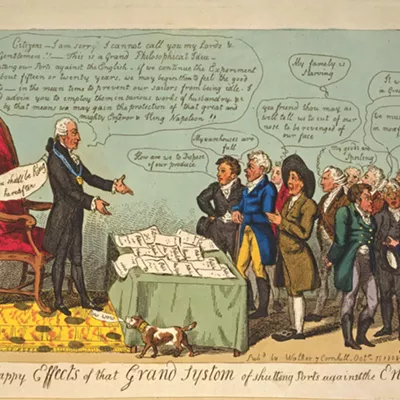Should Americans worry about a nuclear exchange with North Korea? Let's see: We have in the White House, with his finger on the launch button, a narcissist who watches television eight hours a day, tweets irrationally into the early morning hours, alienates long-time allies, supports for the Senate an alleged child abuser and known racist... Worry? Is that a serious question?
Let's begin there — the finger-on-the-button matter. Consider some history: As tensions between the United States and the USSR worsened during the 1948 Berlin Airlift, President Harry Truman was confronted by just this question. A formal letter had been prepared for Truman's signature giving the Joint Chiefs "custody of the atomic bomb" on the grounds that those who would be ultimately responsible for the use of the weapon should have familiarity with the weapon and work in a unified command structure.
Truman disagreed.
New on the job, he had gone along with the Hiroshima bombing, but later he had learned that the military, on its own, had ordered the Nagasaki bombing.
He didn't want that to ever happen again.
Moreover, having some time to reflect, Truman determined that the use of the atomic bomb was immoral, and for several reasons. Most important, he disagreed with the fundamental premise that the bomb was a "military weapon." In his response denying the Chiefs' request, he began with, "You have got to understand that this isn't a military weapon. It is used to wipe out women and children and unarmed people. So we have to treat this differently from rifles and cannon and ordinary things like that."
What worried Truman, wrote his biographer David McCullough, "was whether he could trust these terrible forces in the hands of the military establishment."
Two days later he ordered that the bomb remain in civilian custody, with the president as the ultimate decider.
Today, with this unstable man in the White House — a man who has brought to Washington unqualified people who disdain and gut institutions — I suggest that the Congress needs to change the policy. And this is a policy question, not a Constitutional question. It's a question that should be addressed directly in the 2018 Congressional elections. (For certain it should be made an issue here in the Fifth District.)
Which brings me to a related point, which, so far as I know, hasn't been examined. All this talk, all the coverage, all the president's blustering has focused on offensive nuclear weapons, e.g. "Trump to 'Little Rocket Man': I can wipe out your entire country."
Truman realized that "wiping out" isn't what war should ever be about. Which brings us to the topic of defensive weapons. It's been several decades since I was privy to the goings on, but that noted, my guess is that while the numeric values have changed (technology certainly has), the equation hasn't. We all knew, during my years with the Navy's Fleet Ballistic Missile program, that it was much cheaper and more effective to research and develop offensive weapons than it was to develop defensive weapons capable of neutralizing those offensive weapons,
Look at it this way: If, say, Country A spends a billion dollars on a new offensive nuclear weapon, it will likely require that Country B spend four times that much developing a defensive response. As Country B, we can afford to do that. North Korea can't.
In the old days we could jam any defensive system just by spewing out confetti. Just watch The Hunt for Red October — I'm certain that the offensive weaponry today uses much more sophisticated technology, making defensive weaponry even more expensive to develop.
President Ronald Reagan's Star Wars was fundamentally flawed because it was designed as a "shield' against a Soviet mass attack; the Soviets possessed so many offensive weapons that they could flood any defensive network.
That caveat noted, against countries with limited numbers of offensive nuclear weapons and little or no defensive capability, like North Korea? Defensive measures could work. If America can protect against a limited attack on South Korea, Guam, Japan and maybe our West Coast, the ball game for the North Koreans is over. Negotiation becomes their only option. My point: Should we not use our spending advantage on defense rather than on more offense?
Trump obviously doesn't understand any of this. Most important, he doesn't understand what Harry Truman was getting at — that nuclear weapons aren't military weapons; they are mass murder weapons.
I'm not saying that turning things over to the Joint Chiefs is a good long-term strategy, if that's what Congress were to decide. Today's Gen. James Mattis (now our Secretary of Defense) could well be tomorrow's Gen. Curtis LeMay, the Cold Warrior known for inspiring the crazed Gen. Jack Ripper in Dr. Strangelove.
Still, constraining Donald Trump would be a critically important start. ♦






















